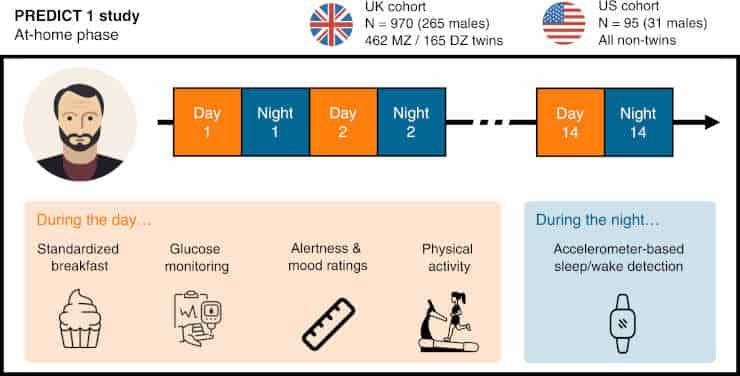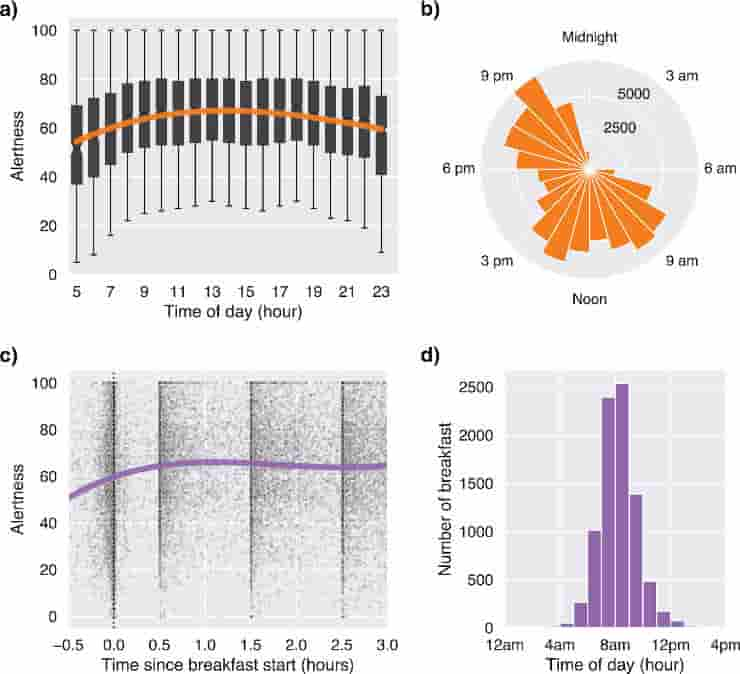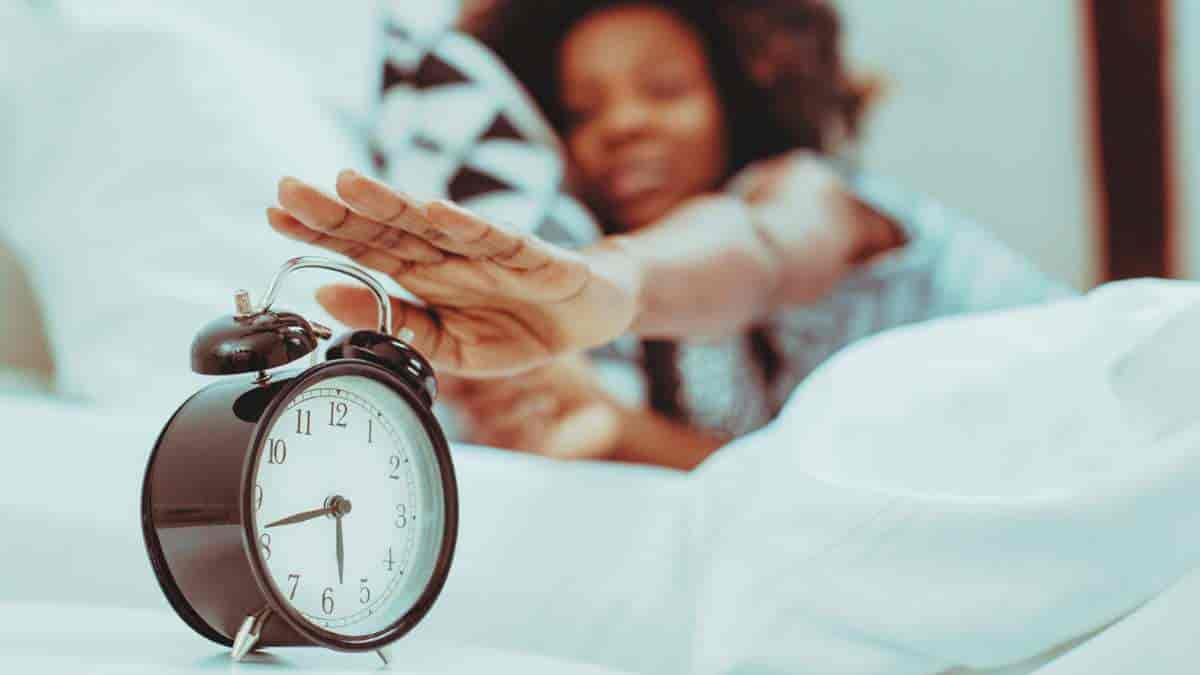Do you feel groggy until you’ve had your morning cup of coffee? Do you battle sleepiness throughout the workday?
You’re not alone. Many people struggle with morning alertness, but a recent study shows that waking up refreshed each day is not just something a lucky few are born with.
According to their findings, you can wake up each morning without feeling sluggish by paying attention to three key factors: sleep, exercise, and breakfast.
The results are based on a thorough examination of the actions of 833 participants who, over a two-week period, were given a variety of breakfast meals, wore wristwatches to track their physical activity and sleep quantity, quality, timing, and regularity, kept food diaries, and recorded their alertness levels from the moment they woke up until the end of the day. The research included identical and fraternal twins to separate the effects of genes from environment and behaviour.
Three-part Regimen
The researchers discovered that the key to alertness is a three-part regimen that includes
- significant exercise the day before
- sleeping longer and later into the morning
- eating a breakfast high in complex carbohydrates with limited sugar
The researchers also discovered that a healthy, controlled blood glucose response after eating breakfast is essential for better waking up.
“All of these have a unique and independent effect. If you sleep longer or later, you’re going to see an increase in your alertness. If you do more physical activity on the day before, you’re going to see an increase. You can see improvements with each and every one of these factors,”
said first author Raphael Vallat, a postdoctoral fellow at the University of California, Berkeley.
Morning Grogginess
Morning grogginess is more than an inconvenience. It has far-reaching societal implications: Many car accidents, workplace injuries, and large-scale disasters are caused by people who have problems waking up alert.
Well-known examples include the Exxon Valdez oil spill in Alaska, the Three Mile Island nuclear meltdown in Pennsylvania, and an even worse nuclear accident in Chernobyl, Ukraine.
“Many of us think that morning sleepiness is a benign annoyance. However, it costs developed nations billions of dollars every year through loss of productivity, increased healthcare utilization, work absenteeism. More impactful, however, is that it costs lives—it is deadly,”
said senior author Matthew Walker, professor of neuroscience and psychology and author of Why We Sleep (Simon & Schuster, 2018).
Sleepiness has a high cost, from car accidents to work-related accidents. Scientists need to understand how to help society wake up better and reduce the mortal cost of society’s current struggle to wake up effectively every day.
Glucose Response

Walker and Vallat collaborated with researchers from the United Kingdom, the United States, and Sweden to analyze data collected by Zoe Ltd., a UK company that followed hundreds of people for two weeks to learn how to predict individualized metabolic responses to foods based on a person’s biological characteristics, lifestyle factors, and the nutritional composition of the foods.
For the entire two weeks, the researchers gave participants pre-prepared meals with different proportions of nutrients incorporated into muffins to see how they responded to different diets upon waking.
A standardized breakfast with moderate amounts of fat and carbohydrates was compared to a high protein (muffins plus a milkshake), high carbohydrate, or high sugar (glucose drink) breakfast. The subjects also wore continuous glucose monitors to track their blood glucose levels throughout the day.
High Carbohydrate Breakfast
The worst type of breakfast, on average, contained high amounts of simple sugar; it was associated with an inability to wake up effectively and maintain alertness. Participants experienced sleepiness after eating this sugar-laden breakfast.
In comparison, the high carbohydrate breakfast — which contained more carbohydrates than simple sugar and only a small amount of protein — was associated with people revving up their alertness quickly in the morning and maintaining that alert state.
“A breakfast rich in carbohydrates can increase alertness, so long as your body is healthy and capable of efficiently disposing of the glucose from that meal, preventing a sustained spike in blood sugar that otherwise blunts your brain’s alertness,”
Vallat said.
“We have known for some time that a diet high in sugar is harmful to sleep, not to mention being toxic for the cells in your brain and body,”
Walker added
In addition to these negative effects on sleep, however, the researchers have discovered that consuming breakfast with a high sugar content and experiencing a blood sugar spike following any type of breakfast meal significantly impairs the brain’s ability to return to a state of wakefulness after sleep.
Sleep Inertia
However, it was not all about food. Sleep was extremely important.
Specifically, Vallat and Walker discovered that sleeping longer than usual and/or sleeping later than usual rapidly increased alertness upon waking.
According to Walker, seven to nine hours of sleep is optimal for eliminating “sleep inertia,” the inability to effectively transition to a state of functional cognitive alertness upon awakening. The majority of individuals require this amount of sleep to eliminate a chemical called adenosine, which accumulates in the body throughout the day and causes sleepiness in the evening, a phenomenon known as sleep pressure.
“Considering that the majority of individuals in society are not getting enough sleep during the week, sleeping longer on a given day can help clear some of the adenosine sleepiness debt they are carrying,”
Walker speculated.
There is a second reason why sleeping later can improve alertness. When you wake up later, you rise at a higher point on the upswing of your 24-hour circadian rhythm, gradually increasing throughout the morning and heightening your alertness.
The Exercise Factor

(a) Alertness as a function of time of day. The orange line shows a cubic regression of all the alertness ratings logged between 5am and midnight (n = 89,440).
(b) Polar histogram of the number of alertness ratings as a function of time of day.
(c) Alertness ratings within the first three hours after breakfast onset. Participants were instructed to rate their alertness at t = 0 min, t = 30, t = 90 and t = 150 min after breakfast start. During that ~3 hour period, they were also instructed to fast and avoid physical activity. Each black dot represents one alertness rating from one participant.
(d) Distribution of breakfast start time. By definition in the protocol, the first alertness rating of the day must coincide with breakfast onset.
Credit: Nat Commun 13, 7116 (2022) CC-BY
It’s less clear what physical activity does to improve alertness the following day.
“It is well known that physical activity, in general, improves your alertness and also your mood level, and we did find a high correlation in this study between participants’ mood and their alertness levels,” Vallat said. “Participants that, on average, are happier also feel more alert.”
However, Vallat also notes that exercise is typically associated with better sleep and a more positive disposition. It is possible that the improved sleep induced by exercise is one of the reasons why exercise the day before, by aiding sleep that night, increases alertness the following day.
Walker said that the transition from non-consciousness to consciousness — from sleep to wake — is unlikely to be a straightforward biological process.
“If you pause to think, it is a non-trivial accomplishment to go from being nonconscious, recumbent, and immobile to being a thoughtful, conscious, attentive, and productive human being, active, awake, and mobile. It’s unlikely that such a radical, fundamental change is simply going to be explained by tweaking one single thing. However, we have discovered that there are still some basic, modifiable, yet powerful ingredients to the awakening equation that people can focus on, a relatively simple prescription for how best to wake up each day,”
he said.
It’s Under Your Control
Data comparisons between identical and non-identical twins revealed that genetics plays only a minor and insignificant role in next-day alertness, accounting for only about 25% of the differences between individuals.
“We know there are people who always seem to be bright-eyed and bushy-tailed when they first wake up,” Walker said. “But if you’re not like that, you tend to think, ‘Well, I guess it’s just my genetic fate that I’m slow to wake up. There’s really nothing I can do about it, short of using the stimulant chemical caffeine, which can harm sleep.”
However, these new findings send a different, more optimistic message. How you wake up each day is entirely within your control, as it is determined by how you structure your life and your sleep.
You don’t have to accept your fate, throwing your hands up in defeat because ‘…it’s my genes, and I can’t change my genes.’ You can start doing some very simple and doable things today and tonight to change how you wake up each morning, feeling alert and free of that grogginess.
Walker, Vallat, and their colleagues continue to work with the Zoe team to investigate novel scientific questions about how sleep, diet, and physical activity affect people’s brain and body health, steering them away from disease and sickness.
Reference:
- Vallat, R., Berry, S.E., Tsereteli, N. et al. How people wake up is associated with previous night’s sleep together with physical activity and food intake. Nat Commun 13, 7116 (2022).
Last Updated on September 20, 2023
